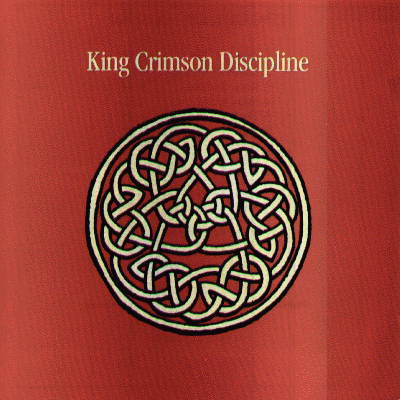 |
From the Vault...
10/06/2002
#806 |

|
info
King Crimson
"Discipline"
© E'G Records
Year of Release: 1981
Rating:


|
track listing
|
Elephant Talk
Frame By Frame
Matte Kudasai
Indiscipline
Thela Hun Ginjeet
The Sheltering Sky
Discipline
|
WSVNRadio Archives
King Crimson related sites:
|
|
|
King Crimson
"Discipline"
King Crimson is labeled as a Progressive Rock band, much like their former
allies Emerson, Lake & Palmer, the early Yes and early Genesis. Yet when the
band reformed in 1981, their music tended to move more towards the direction
of upbeat Jazz with a different sound than your normal Jazz, possibly you could
compare it to later years' International music. The first album that would be
released from this reformation was 1981's Discipline, an album consisting
of a different kind of Jazz, International Music, and uniqueness in sound.
Adrian Belew's guitar playing is what makes this album unique.
He would also become the lead singer for King Crimson. His fast-style playing on
numbers such as "Elephant Talk" and "Frame By Frame" does have
future guitar players wondering how they themselves could play such as Belew.
"Matte Kudasai" is very relaxing, after hearing the first two tracks.
It does fit the New Age Jazz category, with favorable guitar and synthesizer
work. Even Belew's lead vocal does make the listener drift into their own
world, along with the soothing music.
"Indiscipline" favors the Progressive Rock style than the previous
Jazz/New Age Jazz formulas. It's also strange in sound, with spoken vocals,
and with its Progressive Rock sound, and title it does fit this song as
a whole. (Probably considered the least track to listen to.)
"Thela Hun Ginjeet" continues the strangeness, as heard in
"Indiscipline." In comparison, it does have a new wave sound, with a
mix of International music, as heard on The Talking Heads'
Remain In Light.
International Music is best described on "The Sheltering Sky," an
instrumental, featuring distinct African-sounding drumming and unusual sound
effects. This song could easily fit a scene in a movie in an African jungle,
where the main characters are searching through the jungle, in mystery and
suspense, trying to find their ultimate goal. The final and title track,
"Discipline," experiments once again the "minimalist chords" and
repeating guitar lines, making this song unique and interesting.
Discipline is very different. They would continue this style of
music on their next album, 1982's Beat.
Leader Robert Fripp would encounter many personnel changes since its beginnings
in 1969, and would experiment in different types of music when reforming King Crimson.
1970s Progressive Rock would define the "first" Crimson, from 1969-late 1970.
The "second" Crimson was reformed in late 1970, continuing the Progressive Rock
style, until 1972, when they combined the likes of gothic metal and free
improvisation. The band broke up (again) in 1974, and Fripp would reform his
"third" Crimson in 1981, aiming towards International music, which would later be
accomplished by such acts as Peter Gabriel and Talking Heads.
Like his fellow allies in International Music, Robert Fripp was adjusting
to the times, and viewing the different stages of popular music. Where
Discipline's style may or may not attract Rock fans, King Crimson has
always been an interesting band, and you could even say they may have been
ahead of its time. All in all, King Crimson is an interesting place to visit,
and has the listener thinking differently on how music is interpreted through
the eyes and ears of leader Robert Fripp.
© WSVNRadio.net. All rights reserved.
Review or any portion may not be reproduced
without written permission. Cover art is the
intellectual property of
E'G Records
and is used for reference purposes only.
|
|




